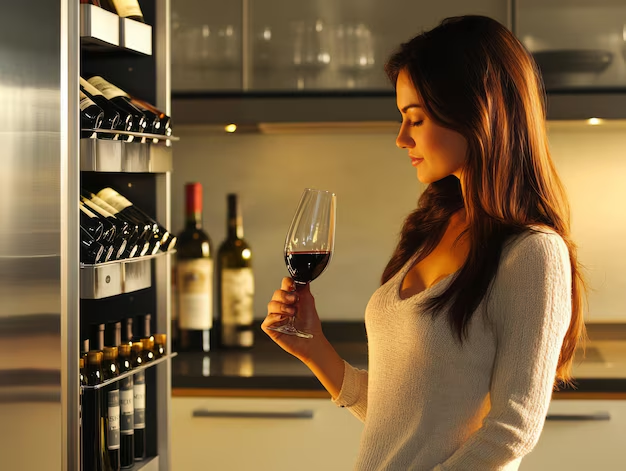How Long Does Wine Last in the Refrigerator?
Whether you're an occasional wine enthusiast or a seasoned connoisseur, the question of how long wine remains good after opening and storing in the refrigerator has likely crossed your mind. Let's explore this topic thoroughly, diving into the factors that influence wine longevity and offering practical tips for extending the shelf life of your favorite vintages.
🍇 Wine Longevity: Understanding the Basics
Wine, that revered elixir, is as complex in its preservation as it is in its flavor profile. Understanding how long it lasts in the refrigerator begins with an exploration of its fundamental characteristics.
The Unopened Bottle: Shelf Life Before It's Even Popped
Unopened bottles of wine can last various durations, depending on the type:
- Red wines: Generally age well if stored properly, often lasting up to 5 years.
- White wines: Typically best consumed within 1 to 2 years.
- Rosé and dessert wines: Enjoy these within 1 to 3 years for optimal flavor.
- Sparkling wines: Best enjoyed soon after purchase but can last a few years.
Keeping your wine bottles in a cool, dark place and laying them on their side can help extend their life even when unopened.
After the Pop: How Long Does Wine Last Once Opened?
Once opened, the clock starts ticking for your wine. Here’s a general guideline:
- Red wine: Usually lasts 3 to 5 days in the fridge, especially when recorked or using a wine stopper.
- White and rosé: 5 to 7 days with proper sealing.
- Sparkling wine: Best consumed within 1 to 3 days after opening due to its fizz.
- Fortified wines: These can last up to 28 days in the refrigerator due to their higher alcohol content.
💡 Tip: Use a vacuum pump to remove air from the bottle before storing in the fridge to extend freshness.
🍷 Factors affecting Wine Longevity
Several factors come into play when determining how long your wine can last in the fridge after opening.
Oxidation: The Silent Spoiler
Oxidation is the main enemy of wine longevity. Once exposed to air, wine begins to oxidize, altering its flavor, color, and aroma. You can minimize this with airtight seals and proper storage methods.
Temperature: Why the Fridge?
Temperature now plays a critical role as it slows the oxidation process, which is why refrigeration is key for extending wine life. The cold environment stabilizes the wine, reducing the chemical reactions that spoil it.
Type of Wine: Not All Wines Are Created Equal
Different wines react differently once opened. Here are some considerations:
- Tannins in red wines act as preservatives, hence why reds last longer.
- Acidity in whites and rosés provides a moderate preservative effect, helping them endure a tad longer.
- Carbonation in sparkling wines dissipates quickly, shortening their fridge life.
🥂 Enhancing Wine Longevity: Practical Tips
To make the most of every bottle, here are some methods to extend the life of your wine while it rests in the refrigerator.
Recorking: Simple but Effective
Always recork or re-seal the bottle before placing it in the fridge. This straightforward practice helps maintain its integrity by limiting air exposure.
Specialized Stoppers: A Worthy Investment
Invest in quality stoppers, such as vacuum pumps or nitrogen systems, to protect your wine's freshness.
Keep It Upright
Store wine bottles upright in the refrigerator to minimize surface area exposure to air, which can accelerate spoilage.
Draw a Baseline
Create a practice of tasting wines at various intervals after opening to recognize the signs of spoilage like sour taste, pungent smell, or color changes.
🍽️ Related Subtopics: Useful Information and Context
Understanding how long your wine will last in the refrigerator opens the door to related areas of interest that enhance your overall wine experience.
Wine and Food Pairing: Preserved Wine Opportunities
Using leftover wine for cooking can transform meals:
- Red wine: Enhances the flavor of stews, sauces, and reductions.
- White wine: Adds depth to poultry or seafood dishes.
- Sparkling wine: Think beyond a drink; use it in salad dressings or as a tenderizing agent for proteins.
By aligning wine type with food, you can maximize your wine's utility and avoid wastage.
Reimagining Wine Toward Sustainability
Embrace sustainability by considering innovative uses for leftovers:
- Create wine vinegar for culinary uses.
- Use stale wine for marinating or pickling.
- Donate unused wine to organizations that facilitate food and wine events.
📊 Quick Summary: How to Make Wine Last Longer in the Fridge
Here’s a handy summary to keep in mind when preserving wine:
- 🍇 Unopened Wines: Store in a cool, dark place; best used within original longevity limits.
- 🍷 Opened Wines in the Fridge:
- Red: 3-5 days
- White/Rosé: 5-7 days
- Sparkling: 1-3 days
- Fortified: Up to 28 days
Key Takeaways:
- Recork after opening.
- Utilize airtight wine stoppers.
- Store upright to limit air exposure.
🍾 Final Insight: Making the Most Out of Your Wine
Understanding how long wine remains good in the refrigerator is more than just about preservation; it's about making the most of your enjoyment while also respecting the craftsmanship behind each bottle. Whether it’s savoring a preserved wine with the perfect pairing or creatively using what's left for cooking, you're ensuring nothing goes to waste, showcasing a true appreciation for every drop. Here's to making informed, satisfying, and sustainable choices for each bottle you pop open! 🥂

